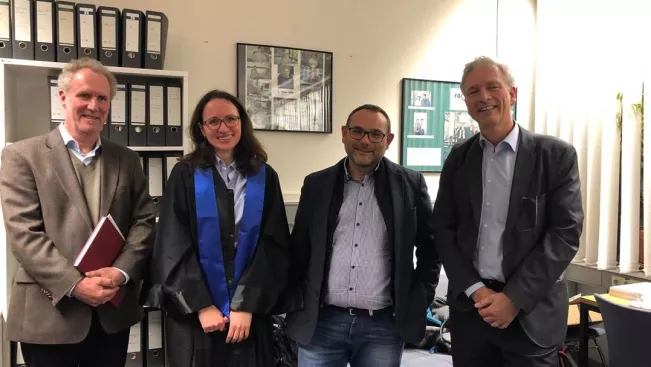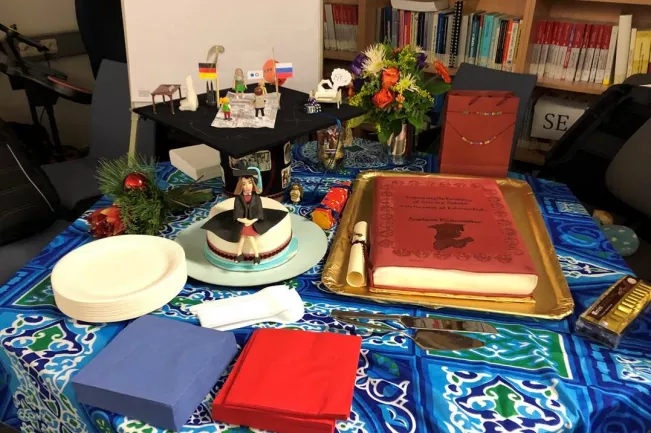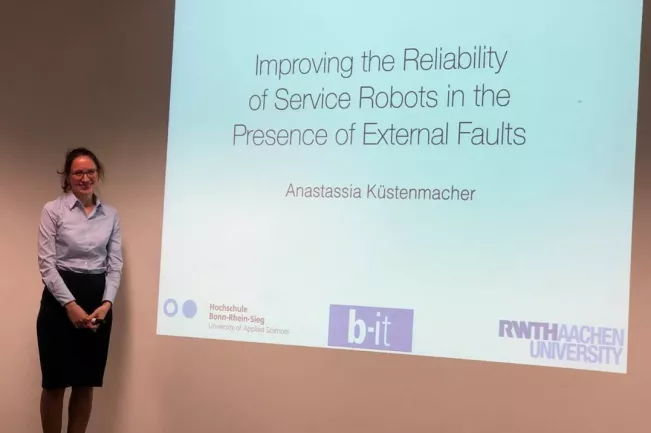Graduierteninstitut
Magna cum laude - PhD for Anastassia Küstenmacher


With the research work "Improving the Reliability of Service Robots in the Presence of External Faults" Anastassia Küstenmacher makes an important contribution to the understanding of the learning ability of robots. The Graduate Institute (GI) in conversation with the AI expert on error analysis, the advancement of women and defence.
GI: To err is human. Does this also apply to robots?
Anastassia Küstenmacher: I have dealt with household service robots and their failure analysis. Robots are fascinating creatures, but they are only accepted by users if processes are smoothly restored after malfunctions. Even a robot, however well modelled, cannot successfully perform its tasks if unpredictable situations occur in its environment that it does not yet know. We humans have learned this, and we also teach it to robots. So I have examined the most common errors in typical scenarios observed in demonstrations and competitions with the autonomous service robots Care-O-Bot III and youBot.
GI: What conclusion did you come to?
Küstenmacher: We identified four different fault classes caused by disturbances, imperfect perception, inadequate operator planning and chaining of actions. Finally, my work presents two approaches to dealing with external errors caused by inadequate knowledge of the planner's preconditions.
GI: How do you explain this to non-computers?
Küstenmacher: This has less to do with computer science than with naive physics, a well-known theory whose practical application has so far received little attention in robotics. An example: Depending on how objects are placed on a table, they are formalized for the robot in a logical frame. He learns from "mistakes" that a cup falls from the table when more than half of the bottom of the cup has no contact with the surface. The robot must learn like human children. Naive physics offers great opportunities to judge unknown external errors in robotics. Robotics therefore also means critically questioning the apparently self-evident.
GI: You did your doctorate in applied robotics, which is considered a male domain.
Küstenmacher: First of all, I studied mathematics in Russia, and that wasn't a male domain at all. In terms of numbers, the relationship between the sexes was very balanced, which certainly has historical reasons. In Russia, the desire to let women participate in all areas of working life was more pronounced than in Germany. When I came here, I noticed how strict the separation of the sexes was. And there are historical reasons for that, too. For me personally, it was always a matter of course to trust me with everything.

GI: Do you think that female and male computer science students differ?
Küstenmacher: When I switched from mathematics to computer science, I noticed that more men work in programming. As a woman, I had it harder and had to bring more expertise than my male colleagues to be noticed. As a lecturer at the university, I regularly experience that students "tick" differently in computer science. The women pay attention to many details even off the beaten track and are incredibly diligent. Men are very focussed and often bring confident practical skills with them right from the first semester, but find it a little more difficult to work scientifically. Men and women complement each other perfectly. In robotics, it should be our goal to form teams of scientists that are as heterogeneous as possible in order to look at diverse challenges from different perspectives.
GI: Do you think a special promotion of women is necessary?
Küstenmacher: Absolutely. We must enable young women to have more confidence in themselves. The engineering sciences in particular still offer a lot of scope and excellent opportunities for women.
GI: You yourself were a doctoral fellow of the Equal Opportunities Office. To what extent did the scholarship help you?
Küstenmacher: I was a H-BRS scholarship holder for three years and was able to concentrate so intensively on my work. During this time, I mastered most of the publications. After I had reached such important milestones in my doctoral thesis, we had our second child. I was also able to get involved with that. The parental leave I felt was a creative phase, a kind of sabbatical. Looking back it was also important for the process of my doctoral thesis.
GI: How did your final defense go?
Küstenmacher: The exact procedure depends on the doctoral regulations of the respective university. At RWTH Aachen University, I gave a lecture in a public part and took an oral examination of about one hour. The committee examining me consisted of five persons, including three experts, one examiner and one chairman. I felt that the discussion with them was an exchange on an equal footing about methodology and not a "being asked questions" as we know it from our studies. Of course I was excited, and a burden fell off me afterwards. However, the greater relief had already come months before, after I had submitted my doctoral thesis for review.
GI: And where does my professional future lead to?
Küstenmacher: I'm interested in teaching, so I'm going to stay at the university with a teaching position for the time being. But I will also try to go into industry in order to keep all options open to me.
Examination committee
Reports: University Professor Gerhard Lakemeyer, Ph.D. (RWTH Aachen), Prof. Dr. rer. nat. Paul G. Plöger (H-BRS), Associate Professor Dr. techn. Gerald Steinbauer (Institute for Software Technology); Chair: Prof. Dr. Ir. Joost-Pieter Katoen (RWTH Aachen); Examiner: Prof. Dr. Bastian Leibe
(Defence: 19.11.2018; author of all photos published on this page is Iman Awaad.)